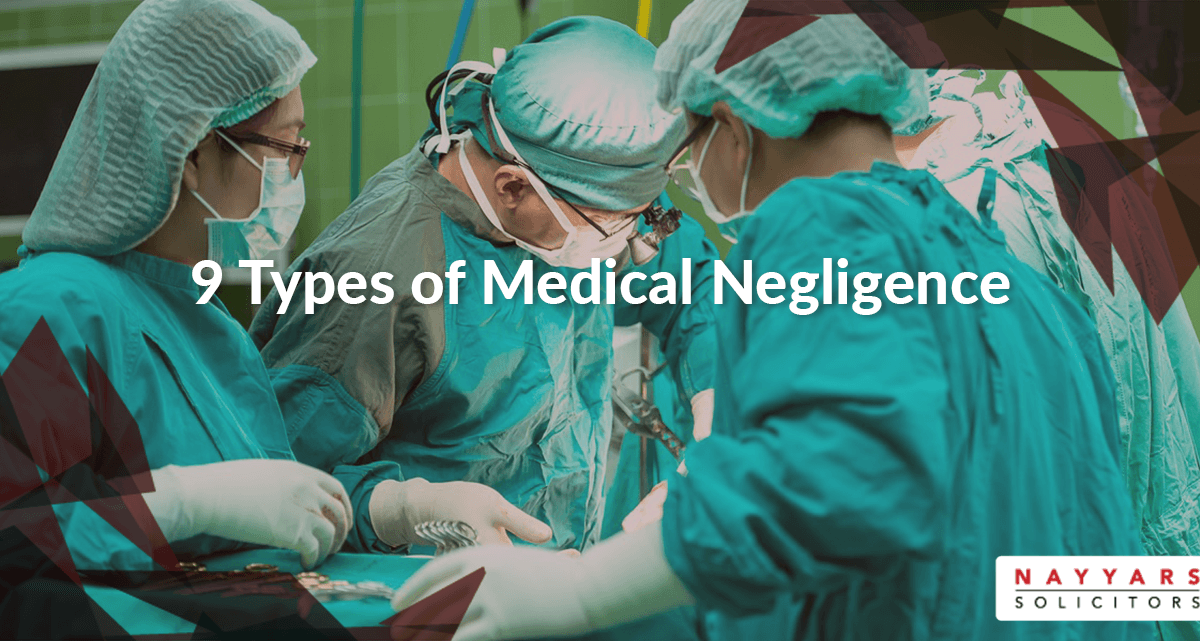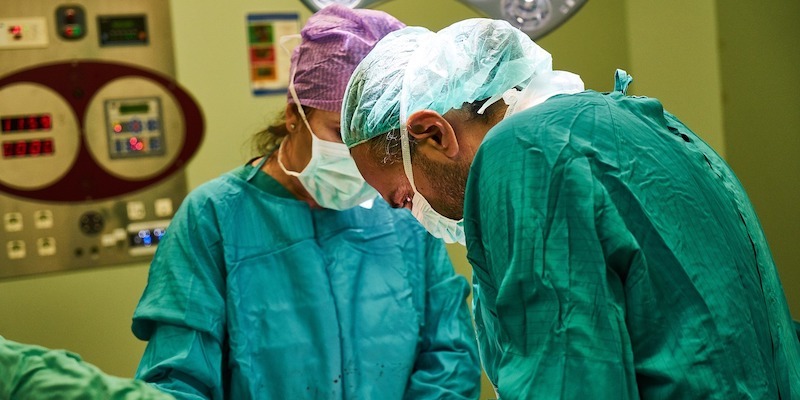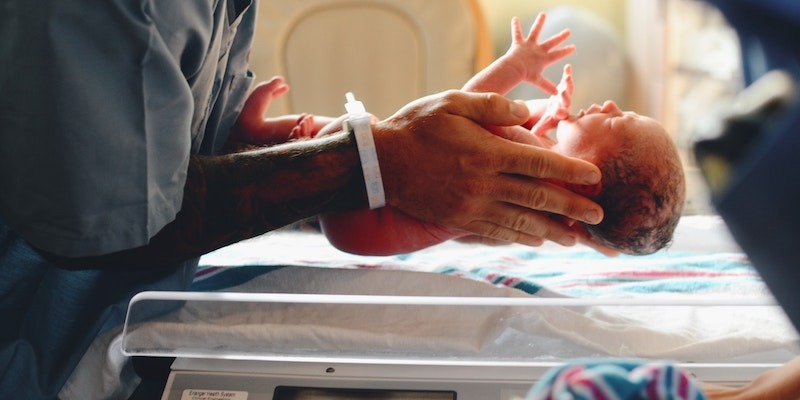LAW SOCIETY EXCELLENCE AWARDS 2019 WINNER!
9 Types of Medical Negligence

When you visit a medical professional, the assumption is that they are going to provide you with a high quality of care and treatment. While this is ordinarily the case, there are times when this care falls well below the standard expected, and when it comes to your health, this can have a serious impact.
Of course, medical treatment is not always guaranteed to work. In some cases, the right steps were taken, even if the desired outcome was not achieved. This can make determining medical negligence difficult, as it is not always obvious whether you were the victim of bad care or just bad luck.
If you suspect that you may have suffered medical negligence, one of the best ways to determine whether you have is by looking at the common types of medical negligence.
With that in mind, we are going to share nine types of medical negligence so you can see if any sound like the experience you had.
Before we do, though, it is important to point out that there are many different forms of medical negligence, ranging from botox injury to being prescribed the wrong pills. Due to the wide range of types, you should always speak to a solicitor to identify exactly what type of claim you should make.
Types of Medical Negligence
1. Misdiagnosis
 Misdiagnosis occurs when a medical professional fails to diagnose what condition a patient is suffering from. This may be because they think the patient has a different illness, or because they do not notice their condition at all.
Misdiagnosis occurs when a medical professional fails to diagnose what condition a patient is suffering from. This may be because they think the patient has a different illness, or because they do not notice their condition at all.
As a result of medical misdiagnosis, a patient may have been prescribed the wrong treatment or none at all, resulting in their condition worsening and potentially even being life-threatening.
Medical misdiagnosis can also take place where there was a delay in identifying the condition.
2. Surgical Negligence
Surgery almost always comes with some inherent risk, but sometimes mistakes are made that should never happen. These ‘never events’ include foreign objects being left in patients or the wrong area of the body being operated on.
In some extreme cases, patients have even had the wrong operation performed on them as a result of clerical mistakes. Alongside mistakes, surgical negligence can also take place where an operation wasn’t necessary in the first place or the patient didn’t fully consent.
3. Anaesthesia
 Anaesthetic is a common part of medical treatment and something most of us are given at some point in our lives, whether it be in the hospital or at the dentist.
Anaesthetic is a common part of medical treatment and something most of us are given at some point in our lives, whether it be in the hospital or at the dentist.
Medical negligence can occur as a result of the improper application or a failure to monitor how it is impacting the patient. The results can range from patients waking up during surgery to brain damage as a result of a lack of oxygen.
4. Prescription and Medication Errors
Thousands of prescriptions are written and dispensed each day, and in rare cases, errors can occur. These mistakes may take the form of the wrong medication or dosage being given to you, medications being prescribed together that should not be, or medications being given to patients despite knowing they are allergic to them.
The consequences of the wrong medication being prescribed or dispensed to you can be serious and can range from digestive problems to death.
5. Long-Term Negligent Treatment
 Most medical conditions are not cured overnight. Instead, it is likely that a patient will need long-term treatment or care. Where a medical professional fails to monitor the impact of the treatment properly or does not schedule the correct follow-up appointment, medical negligence can take place.
Most medical conditions are not cured overnight. Instead, it is likely that a patient will need long-term treatment or care. Where a medical professional fails to monitor the impact of the treatment properly or does not schedule the correct follow-up appointment, medical negligence can take place.
In these cases, negligent treatment can lead to further illness or injury or the return of the previous condition.
6. Negligent Medical Advice
While most of us rely on a medical professional’s expertise for treatment, patients are still meant to be advised on any risks, side effects or alternatives available. This advice is integral to being able to make an informed decision.
If they fail to advise you in this way and something subsequently goes wrong with your treatment, medical negligence may have taken place.
7. Pregnancy and Birth Injuries
 Birth injuries can include any harm the mother or baby suffers either during and after the pregnancy. These injuries can have life-changing ramifications for both mother and child, and examples include cerebral palsy, bowel trauma and maternal diabetes.
Birth injuries can include any harm the mother or baby suffers either during and after the pregnancy. These injuries can have life-changing ramifications for both mother and child, and examples include cerebral palsy, bowel trauma and maternal diabetes.
Negligence can also take the form of wrongful birth cases, such as where a vasectomy failed or parents were not warned that a child would have been born with a specific injury.
8. Dental Negligence
It is important to note that it is not just your local NHS doctor who can provide negligent care. A number of medical negligence claims come about as a result of low-quality treatment from a dentist.
Dental negligence can occur in many of the ways we have already discussed, from poorly performed surgical procedures to misdiagnosis or inadequate patient care.
9. Negligent Cosmetic Care
 Cosmetic surgery is becoming more and more popular among both men and women. So, it is no surprise that we are seeing a rise in the number of medical negligence cases resulting from cosmetic surgery.
Cosmetic surgery is becoming more and more popular among both men and women. So, it is no surprise that we are seeing a rise in the number of medical negligence cases resulting from cosmetic surgery.
Where cosmetic care is not good enough, individuals can be left with long-lasting physical and emotional damage and may require further care. Medical negligence can arise from a range of cosmetic surgeries including botox and liposuction.
Do You Have a Medical Negligence Claim?
If you suspect that you may have been the victim of medical negligence, it is important that you act quickly. Unless you were under the age of 18 when the suspected negligence happened, in most cases, you only have three years from the date you first realised you had been a victim of medical negligence to make a claim.
While this may seem like a long time, medical negligence claims can take a long time to build, as the evidence you need to provide is extensive. Therefore, you should not waste time in speaking to a solicitor who can review your claim and begin building your case.
So, if negligent medical care has resulted in injury to you, get in touch with the Nayyars team to learn how we can help you.


